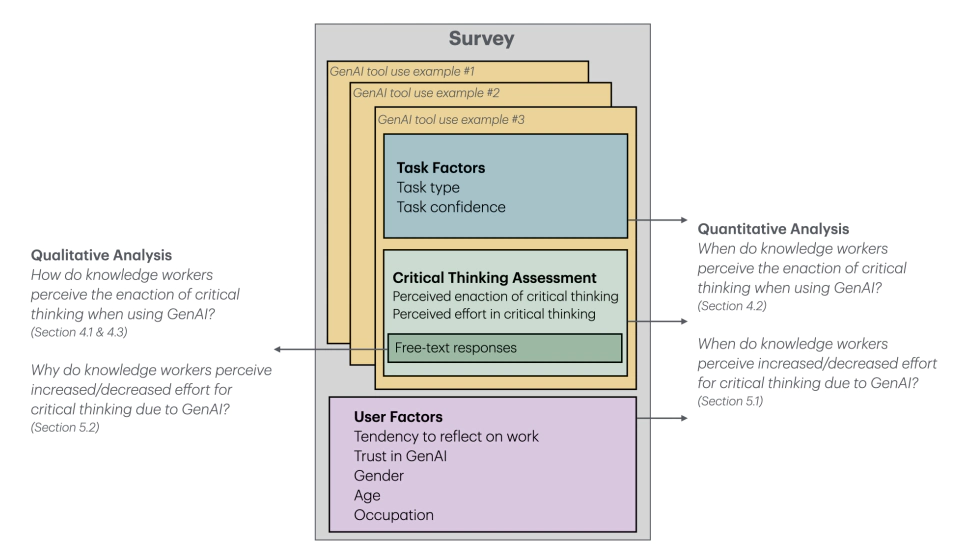The increasingly tense generative AI war is making a change in the way people use the internet and technology. This apparently, also changes the way people's minds work.
The rise of generative AI is giving people a lot of options they can choose. From OpenAI that started the trend, to AI products from Google, Microsoft, Anthropic, Meta, to DeepSeek, and lots more.
With these tools, users can ask pretty much anything, and get thorough answers.
The increasing sophistication of AI tools is making them incredibly persuasive and user-friendly. This ease of use is driving even greater adoption, transforming the modern workplace into an environment of unprecedented efficiency.
This however, raises questions about its impact on critical thinking skills and practices.
Researchers at Microsoft and Carnegie Mellon University have found some bad news.

On their research paper, humans increasingly rely on generative AI in their work and as a result, they use less critical thinking, which can "result in the deterioration of cognitive faculties that ought to be preserved."
Researchers arrived at these findings after surveying and analyzing the responses from 319 knowledge workers to explore how and when they engage in critical thinking while using generative AI, as well as the factors influencing their cognitive effort.
The extensive study evaluated AI use cases from participants who shared 936 firsthand examples of integrating AI into their work, and the confidence or lack thereof depicted by employees when leveraging AIs to accomplish tasks.
Some of the tasks cited in the paper include a teacher using the AI image generator to create images for a presentation about hand washing at school, a commodities trader using a generative AI tool to "generate recommendations for new resources and strategies to explore to hone my trading skills," and a nurse who verified an generative AI-generated educational pamphlet for newly diagnosed diabetic patients.
Quantitative findings suggest that both confidence in AI and self-assurance in task execution influence the likelihood and intensity of critical thinking in AI-assisted tasks.
Specifically, greater reliance on AI correlates with reduced critical analysis, while higher self-confidence encourages more active engagement.
On a qualitative level, AI reshapes critical thinking, emphasizing information verification, response synthesis, and task oversight.

The findings revealed that professionals who confidently use generative AI tools at work encountered issues when presented with scenarios that required them to put their critical thinking to the test compared to less reliant users.
As such, this presented them with an edge to leverage their knowledge to enhance the quality of the AI-generated output.
The more people put confidence in AIs doing their work, the more they observed "their perceived enaction of critical thinking."
While using AI to help in low-stakes tasks like proofreading might appear benign, it still "can lead to significant negative outcomes in high-stakes contexts," the authors said, pointing out that it’s "risky for users to only apply critical thinking in high-stakes situations."
The researchers concluded that without regularly engaging in critical thinking, "cognitive abilities can deteriorate over time."
This is the reason why those people who were surveyed and said that they had less confidence in the AI’s output, and used more of their critical thinking and had more confidence in their own ability, the more they're able to retain their cognitive ability and confidence.

In other words, AI dependencies can make people work faster and more efficiently.
However, they're also making people 'dumber.'
"While AI can improve efficiency, it may also reduce critical engagement, particularly in routine or lower-stakes tasks in which users simply rely on AI, raising concerns about long-term reliance and diminished independent problem-solving," they continued, citing past findings that dependence on technology deprives humans the ability to constantly hone their judgement skills and "leav[es] them atrophied and unprepared when the exceptions do arise."
"Across all of our research, there is a common thread: AI works best as a thought partner, complementing the work people do. When AI challenges us, it doesn’t just boost productivity; it drives better decisions and stronger outcomes," one of the authors, Lev Tankelevitch, Sr. Researcher, Microsoft Research, said
Noting that there’s been some evidence where AI enhances critical thinking when it was led by humans and guided by educators, Tankelevitch added that "on the flip slide, our survey-based study suggests that when people view a task as low-stakes, they may not review outputs as critically."
"Our insights reveal new design challenges and opportunities for developing GenAI tools for knowledge work," the team said.
